Embassy of Pakistan Commemorates Youm-e-Istehsal
By Elaine Pasquini

Washington: On August 5, the Embassy of Pakistan held a webinar commemorating “Youm-e-Istehsal,” the day in 2019 when the Indian government repealed Articles 370 and 35A of India’s Constitution, thereby revoking Kashmiris’ right to self-determination.
“The events that took place three years ago today cast a shadow over the fate of the Kashmiris and the peace and security in South Asia,” said Ambassador Masood Khan. “In the past year, the attention to Indian-occupied Jammu and Kashmir has decreased because of the Ukraine crisis and developments in the Asia Pacific region.”
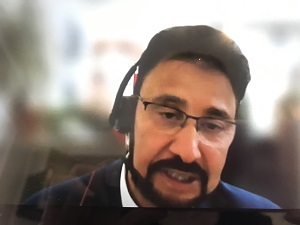
Afzal Khan |
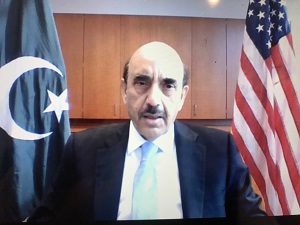
Amb Masood Khan |
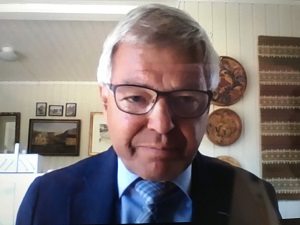
Kjell Magne Bondevik |
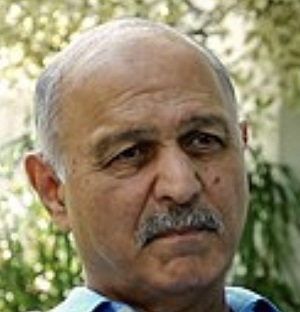
Mushahid Hussain |
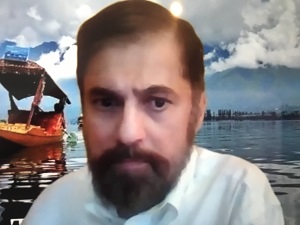
Rizwan Kadir |
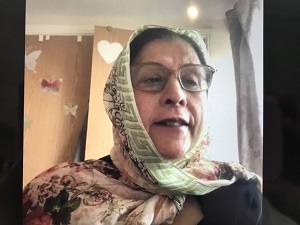
Shamim Shawl |
During this period, he noted, civil liberties and parliamentary freedoms were denied to the Kashmiri citizens and the right to free expression was violated with impunity. “In crackdowns, political activists and journalists are being persecuted and incarcerated,” the ambassador stated. “These actions violate international law and relevant United Nations Security Council resolutions.”
The ambassador said India should reinstate Articles 370 and 35A of the Indian constitution to restore the Kashmiris’ right to self-determination as recognized in UN Security Council resolutions and reiterated by reports of the UN High Commissioner for Human Rights in 2018 and 2019.
In addition, space must be created for multilateral diplomacy and a dialogue amongst representatives of Pakistan, India and Jammu and Kashmir for a just democratic resolution of the dispute in accordance with UN Security Council resolutions.
Pakistani Senator Mushahid Hussain pointed out that since August 5, 2019, half a million Kashmiris have lost their jobs, while the economy has suffered a loss of $5.3 billion. In addition, four million new domiciles have been given to outsiders, mostly non-Muslims, which will change the demographics of the region.
The Pakistani senate just passed a unanimous resolution calling India’s annexation of Jammu and Kashmir “illegal,” Mushahid related. “It’s about humanity; it’s about legality and the issues of peace, security and stability in a dangerous part of the world where India is very aggressively almost on a warpath against its own people especially the Muslim people within India and in Indian-occupied Kashmir.”
Concerned about the lack of international attention to the Kashmir crisis, the senator pointed out that when Russia annexed Crimea in 2014 that event was widely condemned as a violation of international law and the UN Charter. “But there was hardly a whimper when India annexed Jammu and Kashmir in 2019,” he said. “I think that these kinds of double standards dilute the international community’s commitment to principles.”
Stressing the ideological agenda of Indian Prime Minister Narendra Modi of “Muslim-bashing at home and Pakistan-bashing abroad,” Mushahid saluted the “valiant Kashmiri people for their heroic struggle against the Indian occupation” which is now “a threat and danger to regional peace and security.”
Afzal Khan, deputy leader of the UK House of Commons and a strong voice for the Kashmiris within the British Parliament, commented that this year marks the 75th year of partition, making Kashmir the longest unresolved conflict on the agenda of the United Nations.
Protests in Indian-occupied Jumma and Kashmir are prohibited, and Kashmir is the only state where a crowd control gun is used which has caused more than 700 Kashmiris, including infants, to go blind, he explained. “It is imperative that UN Resolutions on Kashmir are implemented. The whole of Asia is suffering because of the Kashmir conflict and there is risk of war as China, India and Pakistan are all nuclear powers.”
Since diplomacy is the only way this crisis can be resolved justly for the Kashmiri people, Kjell Magne Bondevik, former prime minister of Norway, told the virtual audience he had discussed the situation with high level people on both sides, but, he added, “it has been more difficult to reach out to the top level of India than it has been in Pakistan where I have been received from all of the political leaders.”
Bondevik called on the Indian Government to release Mohammad Yasin Malik, the chairman of the Jammu and Kashmir Liberation Front, along with thousands of other Kashmiri political prisoners unjustly held in India. An appeal, he said, has been sent to the Indian government through the embassy in Oslo.
“It is high time and urgent to initiate new political efforts which can pave the way for a ceasefire and for peace,” he said. “The United Nations should feel a responsibility, and I appeal to my friend Secretary-General Antonio Guterres to take such an initiative. The people of Kashmir deserve it and it must be an initiative including both India and Pakistan, but also the political leaders of Kashmir.”
Shamim Shawl, a representative for Kashmir at the United Nations Human Rights Council, criticized the Indian government’s actions to absorb the territory of Jammu and Kashmir, along with its practice of targeted killings. The United Nations and international community, she insisted, must intervene to protect the people of Jammu and Kashmir.
Kashmiri American Rizwan Kadir addressed the necessity to inform Americans about the relationship between Kashmir and Pakistan. “The reason Pakistan has been supportive of the Kashmir cause is because every fourth or fifth Pakistani globally has a Kashmiri connection either by marriage or by blood,” he said. “It is important for our second and third generation of Kashmiris living anywhere in the world to know what the issues are, and what we see with the abrogation act of 2019 is nothing surprising. It is something that has been in the works for a long time.”
In conclusion, Ambassador Khan urged the United Nations to take a fresh initiative on the subject and permanent members of the Security Council to take cognizance of the situation so that this dispute does not become a blind spot for the international community. “We need to share facts with a wider audience and project the correct narratives,” he said. “The voices of the Kashmiris should be heard.”
(Elaine Pasquini is a freelance journalist. Her reports appear in the Washington Report on Middle East Affairs and Nuze.Ink.)

